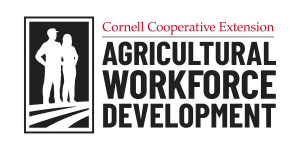It’s the employee management program you’ve been looking for!
Course applicable to all agricultural commodities
Cornell Agricultural Workforce Development has opened registration for two six-week courses in the new Supervisory Leadership Certificate program. Offered again, because of high demand, “Transitioning to Supervisor” course materials release March 19, 2021, with the first live Zoom class meeting on March 25. “Organizing Work for High Quality Results” materials will release June 12, 2021, with the first class the following week. Each six-week course costs $275 and spaces in the course are limited.
Registration link for the first two Agricultural Supervisory Leadership courses
Information link for the Agricultural Supervisory Leadership certificate program
The Agricultural Supervisory Leadership certificate helps farm supervisors and managers learn and apply human resource management practices and leadership skills that foster rewarding workplaces and drive business results. Confident managers who thoughtfully apply leadership and management skills improve employee performance, develop teams, reduce employee turnover, and increase employee engagement. The six courses within the certificate program will offer extensive practice and engagement activities to build confidence and skill sets.
Transitioning to Supervisor
Materials release March 19, 2021 and the course runs through April 29, 2021
This is the course you’ve been waiting for: how to lead people in your farm business! Learn the essential skills for supervising more effectively and creating a great place to work. Transitioning to Supervisor helps new and experienced managers make the difficult, but critical, transition from individual performer to supervisor. Participants learn essential leadership skills, such as: building effective work relationships, essential communication skills, managing conflict, leading a multi-cultural team, and how to build an effective workplace culture.
Organizing Work for High Quality Results
Materials for this course will release June 12, 2021
Organizing Work for High Quality Results teaches how to: Develop clear expectations and standard operating procedures, delegate effectively, and diagnose and correct performance problems.
Who should attend?
This course, and the whole certificate series, is appropriate for both new and experienced farm supervisors and managers, and those preparing to become supervisors. All participants will learn leadership concepts and practice skills that will improve their ability to build a positive workplace and get results through leading others.
From the comfort of your home or office, watch prerecorded presentations on your own schedule, and engage with classmates and instructors during weekly, live discussion sessions. Corresponding assignments are due each week. To get the most out of the experience, expect to spend approximately two hours per week on lessons and assignments.
Course instructors include:
- Richard Stup, Cornell Agricultural Workforce Development Specialist
- Elizabeth Higgins, Ag Business Management/Production Economics Extension Specialist with CCE’s Eastern New York Commercial Horticulture team
- Libby Eiholzer, Bilingual Dairy Specialist, Cargill
- Bob Milligan, Cornell University Professor Emeritus
Direct questions to Rachel McCarthy, Agricultural Supervisory Leadership Coordinator, at rachel.mccarthy@cornell.edu.
Upcoming courses include:
- Managing Performance: Understand motivation. Harness the power of performance feedback and coaching. Build clear and effective workplace communications, including leading team meetings. Set safety expectations. Conduct effective performance reviews.
- Ethics and Employment Regulations for Supervisors: Implement responsible and ethical labor practices and understand why this matters for agriculture. Recognize and prevent sexual harassment. Understand and follow minimum wage and overtime laws. Implement Equal Employment Opportunity laws to prevent discrimination and harassment. Handle employee discipline and termination.
- Becoming an Effective Trainer: Identify training needs. Understand learning styles. Design and plan learning experiences that accommodate learner needs. Develop effective training skills and techniques. Evaluate learning results and training effectiveness.
- Staffing and Organizing Your Team: Develop job descriptions. Learn how to find potential employees, interview and select the right people. Implement new hire documentation, employment authorization, and onboarding: bringing new employees into the business successfully and productively.
Cornell Agricultural Workforce Development’s mission is to help farms and agribusinesses build committed and effective teams who will carry out the important work of feeding the world. We believe that agricultural work can, and should be, engaging and rewarding for everyone involved. Managers can build committed teams by applying the best human resource management practices for the agricultural setting. Key program goals include:
- Provide leadership and management development education focused on farm supervisors, middle managers, and owners
- Clarify workforce regulations that apply to farms and increasing levels of compliance
- Build consistent channels of communication and learning opportunities about agricultural workforce issues
- Conduct research into workforce problems and challenges that confront agriculture


